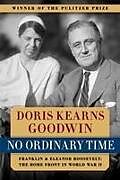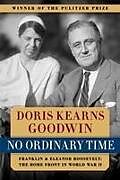No Ordinary Time
Einband:
Kartonierter Einband
EAN:
9780684804484
Untertitel:
Franklin and Eleanor Roosevelt: The Home Front in World War II
Genre:
Geschichte
Autor:
Doris Kearns Goodwin
Herausgeber:
Simon & Schuster N.Y.
Anzahl Seiten:
768
Erscheinungsdatum:
01.04.1995
ISBN:
978-0-684-80448-4
Zusatztext A thoroughly terrific and important work! a valuable addition to Roosevelt literature. . . . Goodwin has deftly reminded us just how extraordinary FDR and Eleanor were in 'no ordinary times.' Informationen zum Autor Doris Kearns Goodwin's interest in leadership began more than half a century ago as a professor at Harvard. Her experiences working for Lyndon B. Johnson in the White House and later assisting him on his memoirs led to her bestselling Lyndon Johnson and the American Dream . She followed up with the Pulitzer Prizewinning No Ordinary Time: Franklin & Eleanor Roosevelt: The Home Front in World War II . She earned the Lincoln Prize for the runaway bestseller Team of Rivals ! the basis for Steven Spielberg's Academy Awardwinning film Lincoln ! and the Carnegie Medal for The Bully Pulpit ! the New York Times bestselling chronicle of the friendship between Theodore Roosevelt and William Howard Taft. She lives in Concord! Massachusetts. Visit her at DorisKearnsGoodwin.com or @DorisKGoodwin. "A thoroughly terrific and important work, a valuable addition to Roosevelt literature. . . . Goodwin has deftly reminded us just how extraordinary FDR and Eleanor were in 'no ordinary times.'" Chapter 1 "THE DECISIVE HOUR HAS COME" On nights filled with tension and concern, Franklin Roosevelt performed a ritual that helped him to fall asleep. He would close his eyes and imagine himself at Hyde Park as a boy, standing with his sled in the snow atop the steep hill that stretched from the south porch of his home to the wooded bluffs of the Hudson River far below. As he accelerated down the hill, he maneuvered each familiar curve with perfect skill until he reached the bottom, whereupon, pulling his sled behind him, he started slowly back up until he reached the top, where he would once more begin his descent. Again and again he replayed this remembered scene in his mind, obliterating his awareness of the shrunken legs inert beneath the sheets, undoing the knowledge that he would never climb a hill or even walk on his own power again. Thus liberating himself from his paralysis through an act of imaginative will, the president of the United States would fall asleep. The evening of May 9, 1940, was one of these nights. At 11 p.m., as Roosevelt sat in his comfortable study on the second floor of the White House, the long-apprehended phone call had come. Resting against the high back of his favorite red leather chair, a precise reproduction of one Thomas Jefferson had designed for work, the president listened as his ambassador to Belgium, John Cudahy, told him that Hitler's armies were simultaneously attacking Holland, Luxembourg, Belgium, and France. The period of relative calm -- the "phony war" that had settled over Europe since the German attack on Poland in September of 1939 -- was over. For days, rumors of a planned Nazi invasion had spread through the capitals of Western Europe. Now, listening to Ambassador Cudahy's frantic report that German planes were in the air over the Low Countries and France, Roosevelt knew that the all-out war he feared had finally begun. In a single night, the tacit agreement that, for eight months, had kept the belligerents from attacking each other's territory had been shattered. As he summoned his military aide and appointments secretary, General Edwin "Pa" Watson, on this spring evening of the last year of his second term, Franklin Roosevelt looked younger than his fifty-eight years. Though his hair was threaded with gray, the skin on his handsome face was clear, and the blue eyes, beneath his pince-nez glasses, were those of a man at the peak of his vitality. His chest was so broad, his neck so thick, that when seated he appeared larger than he was. Only when he was moved from his chair would the eye be drawn to the withered legs, paralyzed by polio almost two decades...
#8220;A thoroughly terrific and important work, a valuable addition to Roosevelt literature. . . . Goodwin has deftly reminded us just how extraordinary FDR and Eleanor were in ‘no ordinary times.’”
Autorentext
Doris Kearns Goodwin’s work for President Johnson inspired her career as a presidential historian. Her first book was Lyndon Johnson and the American Dream. She followed up with the Pulitzer Prize–winning No Ordinary Time: Franklin and Eleanor Roosevelt: The Homefront in World War II. She earned the Lincoln Prize for Team of Rivals, in part the basis for Steven Spielberg’s film Lincoln, and the Carnegie Medal for The Bully Pulpit, about the friendship between Theodore Roosevelt and William Howard Taft. Her bestselling Leadership: In Turbulent Times was the inspiration for the History Channel docuseries on Abraham Lincoln, Theodore Roosevelt, and Franklin Roosevelt, which she executive produced. Her most recent book, An Unfinished Love Story: A Personal History of the 1960s, provides a front-row seat to the pivotal people—JFK, LBJ, RFK and MLK—and events of this momentous decade.
Klappentext
Presenting an aspect of American history that has never been fully told, this Pulitzer Prize-winning work paints a detailed, intimate portrait of FDR and Eleanor Roosevelt and provides a brilliant narrative account of America during wartime. of photos.
Zusammenfassung
A chronicle of the US and its leaders during the period when modern America was created. It narrates the interrelationships between the inner workings of the Roosevelt White House and the destiny of the US, painting a portrait that fills in a historical gap in the story of America under Roosevelt.
Leseprobe
Chapter 1
"THE DECISIVE HOUR HAS COME"
On nights filled with tension and concern, Franklin Roosevelt performed a ritual that helped him to fall asleep. He would close his eyes and imagine himself at Hyde Park as a boy, standing with his sled in the snow atop the steep hill that stretched from the south porch of his home to the wooded bluffs of the Hudson River far below. As he accelerated down the hill, he maneuvered each familiar curve with perfect skill until he reached the bottom, whereupon, pulling his sled behind him, he started slowly back up until he reached the top, where he would once more begin his descent. Again and again he replayed this remembered scene in his mind, obliterating his awareness of the shrunken legs inert beneath the sheets, undoing the knowledge that he would never climb a hill or even walk on his own power again. Thus liberating himself from his paralysis through an act of imaginative will, the president of the United States would fall asleep.
The evening of May 9, 1940, was one of these nights. At 11 p.m., as Roosevelt sat in his comfortable study on the second floor of the White House, the long-apprehended phone call had come. Resting against the high back of his favorite red leather chair, a precise reproduction of one Thomas Jefferson had designed for work, the president listened as his ambassador to Belgium, John Cudahy, told him that Hitler's armies were simultaneously attacking Holland, Luxembourg, Belgium, and France. The period of relative calm -- the "phony war" that had settled over Europe since the German attack on Poland in September of 1939 -- was over.
For days, rumors of a planned Nazi invasion had spread through the capitals of Western Europe. Now, listening to Ambassador Cudahy's frantic report that German planes were in the air over the Low Countries and France, Roosevelt knew that the all-out war he feared had finally begun. In a single night, the tacit agreement that, for eight months, had kept the belligerents from attacking each other's territory had been shattered.
As he summoned his military aide and appointments secretary, General Edwin "Pa" Watson, on this spring evening of the last year of…

Leider konnten wir für diesen Artikel keine Preise ermitteln ...
billigbuch.ch sucht jetzt für Sie die besten Angebote ...
Die aktuellen Verkaufspreise von 6 Onlineshops werden in Realtime abgefragt.
Sie können das gewünschte Produkt anschliessend direkt beim Anbieter Ihrer Wahl bestellen.
Loading...
Die aktuellen Verkaufspreise von 6 Onlineshops werden in Realtime abgefragt.
Sie können das gewünschte Produkt anschliessend direkt beim Anbieter Ihrer Wahl bestellen.
| # | Onlineshop | Preis CHF | Versand CHF | Total CHF | ||
|---|---|---|---|---|---|---|
| 1 | Seller | 0.00 | 0.00 | 0.00 |
